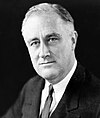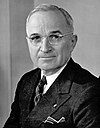Francis Biddle
Francis Biddle | |
|---|---|
NLRA ) | |
| Personal details | |
| Born | Francis Beverley Biddle May 9, 1886 Paris, France |
| Died | October 4, 1968 (aged 82) Wellfleet, Massachusetts, U.S. |
| Political party | Democratic |
| Spouse | Katherine Garrison Chapin |
| Children | 2 |
| Education | Harvard University (BA, LLB) |
| Signature | |
| Military service | |
| Branch/service | United States Army |
| Years of service | 1918 |
| Rank | Private |
| Unit | Field Artillery |
| Battles/wars | World War I |
Francis Beverley Biddle (May 9, 1886 – October 4, 1968) was an American lawyer and judge who was the
Early life and education
Biddle was born in
Career
Biddle first worked as a private secretary to
During World War I he served as Private in the United States Army from October 23 to November 30, 1918.[8] After he enlisted, he was detailed to the Field Artillery Central Officer's training school at Camp Taylor, Kentucky but the war ended during his training and he was discharged.[9]
Roosevelt administration
In the 1930s, Biddle was appointed to a number of important governmental roles. In 1934 President
World War II
During
In 1942, Biddle became involved in a case in which a
Japanese American Internment
Biddle was one of the few top officials, along with FBI Director J. Edgar Hoover and Secretary of Interior Harold L. Ickes, who opposed the wartime internment of Japanese Americans from the start.[14][additional citation(s) needed] [15]
In 1943, after the internment had already taken place, he asked Roosevelt for the camps to be closed: "The present practice of keeping loyal American citizens in concentration camps for longer than is necessary is dangerous and repugnant to the principles of our government."[16] Roosevelt resisted, however, and the camps would not be closed for another year. In a postwar memoir, Biddle wrote that "American citizens of Japanese origin were not even handled like aliens of the other enemy nationalities—Germans and Italians—on a selective basis, but as untouchables, a group who could not be trusted and had to be shut up only because they were of Japanese descent."[17]
African American civil rights
Biddle strengthened his department's efforts on behalf of
Truman administration

At U.S. President Harry S. Truman's request, Biddle resigned after Roosevelt's death. Shortly afterward, Truman appointed Biddle as a judge at the Nuremberg trials. Tom C. Clark, Biddle's successor, told the story that Biddle was the first government official whose resignation Truman sought and that it was quite a difficult task. Biddle was amused by Truman's stammering, but after it was over, he threw his arm around the President and said, "See, Harry, now that wasn't so hard."[citation needed]
In 1947, he was nominated by Truman as the US representative on the United Nations Economic and Social Council. However, after the Republican Party refused to act on the nomination, Biddle asked Truman to withdraw his name.[citation needed]
In 1950, he was named as chairman of the Americans for Democratic Action, a position that he held for three years.[6] One decade later, he wrote two volumes of memoirs: A Casual Past in 1961 and In Brief Authority in 1962. His final position came as chairman of the Franklin D. Roosevelt Memorial Commission from which he resigned in 1965.[citation needed]
Personal life
On April 27, 1918, Biddle was married to the poet Katherine Garrison Chapin. They had two sons:
- Edmund Randolph Biddle (1920–2000),[20] who married Frances M. Disner[21][22]
- Garrison Chapin Biddle (1923–1930)
Biddle died on October 4, 1968, of a heart attack at his summer home in Wellfleet, Massachusetts, on Cape Cod, at the age of 82. Biddle was interred at the St. Thomas' Church Cemetery in Whitemarsh Township, Pennsylvania.
Writing
Biddle's writing skills had long been in evidence prior to the release of his memoirs. In 1927, he wrote a novel about Philadelphia society, The Llanfear Pattern. In 1942, he wrote of his close association with Oliver Wendell Holmes 30 years earlier with a biography of the jurist, Mr. Justice Holmes, which was adapted into a 1946 Broadway play and a 1950 film entitled The Magnificent Yankee. Democratic Thinking and the War was published in 1944. His 1949 book, The World's Best Hope, looked at the role of the United States in the post-war era. He was elected a fellow of the American Academy of Arts and Sciences in 1963.[23]
In popular culture
Biddle was portrayed by
See also
References
- ^ a b c d Twenty-Fourth Annual Report of the Federal Reserve Bank of Philadelphia : 1938
- ^ a b Twenty-Fifth Annual Report of the Federal Reserve Bank of Philadelphia : 1939
- ^ a b Twenty-Third Annual Report of the Federal Reserve Bank of Philadelphia : 1937
- ^ Annual Report of the United States Civil Service Commission, Volumes 49-64 (1932)
- ^ Labor Information Bulletin, Volumes 1-3 (1934)
- ^ a b c d e f Francis Biddle at the Biographical Directory of Federal Judges, a publication of the Federal Judicial Center.
- ^ Political Graveyard: Biddle, Francis Beverley (1886–1968)
- ^ a b Whitman, Alden (October 5, 1968). "Francis Biddle Is Dead at 82; Roosevelt's Attorney General; First Chairman of N.L.R.B. Was Nuremberg Judge -Backed Liberal Causes". The New York Times. Retrieved April 11, 2016.
- ^ Harvard's Military Record in the World War (1921)
- ^ "The Press: Coughlin Quits". Time. May 18, 1942. Archived from the original on October 14, 2010. Retrieved March 13, 2011.
- ^ The New York Times: "18 are Sentenced in Sedition Trial", December 9, 1941, accessed June 20, 2012
- ^ Steele, Free Speech, 208-11; The New York Times: Lewis Wood, "Bridges Ordered Deported at Once", May 29, 1942, accessed June 22, 2012
- ^
"Erschießen oder erhängen?" [Shoot them or hang them?]. Der Spiegel (in German). Vol. 15/1998. April 6, 1998. Retrieved February 23, 2019.
Am Ende begnadigte Roosevelt Dasch zu 30 Jahren, Burger zu lebenslanger Haft. Nachfolger Harry S. Truman ließ beide 1948 nach Deutschland abschieben. [In the end Roosevelt commuted Dasch's sentence to 30 years imprisonment and Burger's to life-long imprisonment. His successor Harry S. Truman had both of them deported to Germany.]
- ISBN 978-1403967923.
- ISBN 978-1598133561.
- ISBN 978-1403967923.
- ISBN 978-0688079963.
- ^
Blackmon, Doublas A. (2008). Slavery by Another Name: The Re-Enslavement of Black Americans from the Civil War to World War II. New York: Anchor Books. pp. 377–379. ISBN 9780385722704.
- ISBN 9780813120485.
- Philly.com. Retrieved April 11, 2016.
- ^ "Miss Disner Fiancee of Edmund R. Biddle". The New York Times. January 26, 1951. Retrieved April 11, 2016.
- ^ "Mrs. Edmund Biddle Has Son". The New York Times. July 10, 1952. Retrieved April 11, 2016.
- ^ "Book of Members, 1780–2010: Chapter B" (PDF). American Academy of Arts and Sciences. Retrieved June 25, 2011.
- ^ "Trying times at Rosebud Theatre". The Strathmore Times. Retrieved August 17, 2012.
- ^ Jones, Kenneth (April 19, 2004). "Victory Gardens Keeps Trying: Joanna Glass With Fritz Weaver Extends Two Weeks". Playbill. Archived from the original on January 31, 2013. Retrieved August 17, 2012.
Further reading
- Fisher, Adrian S. "Francis Biddle." Harvard Civil Rights-Civil Liberties Law Review 9 (1974): 423+ [1].
- Helfman, Tara. "Francis Biddle and the Nuremberg Legacy: Waking the human conscience." The Journal Jurisprudence 15 (2012): 353+. online
- Pahl, Thomas L. "The Dilemma of a Civil Libertarian: Francis Biddle and the Smith Act." Journal of the Minnesota Academy of Science 34.2 (1967): 161–164. pnline
- Rowe, James. "Francis Biddle." Harvard Civil Rights-Civil Liberties Law Review9 (1974): 422.
- Winfield, Betty Houchin. "With Liberty and Justice for All: Attorneys General During the Stress of War." in Journalism and Terrorism (2002). online



